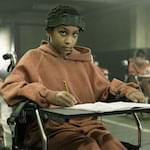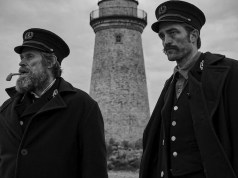
One of my favorite weeks of the year is the one I spend at Austin’s Alamo Drafthouse for Fantastic Fest, a genre celebration devoted to the kinds of movies that other festivals only play at midnight (if they program them at all). Sci-fi, horror, martial arts, dark comedy, action, fantasy, exploitation, and the supernatural are the main ingredients, though the fest has recently begun to expand its horizons and screen movies that don’t exactly fit but which the programmers thought the Fantastic Fest crowd might dig. (“American Honey” is the most glaring example this year. Last year it was the concentration camp drama “Son of Saul.”)
Here are brief reviews of 14 films I saw at this year’s fest (Sept. 22-29). These are all good, good-ish, or mediocre in interesting ways, and they’re all films I was interested in writing about. (I saw others, too, including some that will never see the light of day again.) I might expand on some of these reviews later, when the films come to theaters, but this is a thorough-enough accounting for now. You might also check out the Fantastic Fest episode of Movie B.S. with Bayer and Snider, where we review the films with our voices instead of our writing.
_____________________________

“American Honey”
2 hrs., 43 min.; R for pervasive profanity, sexual dialogue, graphic nudity, bad teenage behavior
“American Honey” won’t make you feel very hopeful about The Kids These Days, but it may fill you with compassion for a generation of unwanted young Americans left to fend for themselves in a cratered economy and a collapsed middle class. With a perceptive eye and unflinching attitude toward the trashy behaviors exhibited by rudderless, underprivileged teens, writer-director Andrea Arnold presents the story of Star (Sasha Lane), an Oklahoma girl who says she’s 18 (we’ll take her word for it) and escapes her dreary existence by joining a crew of feral kids who go door-to-door, town-to-town selling magazines. (“Does anybody actually buy those anymore?” Star asks. “F*** no” is the reply.) This motley assortment of tattooed, tank-topped youth, many of them played by non-actors found by Arnold, has for their captain one Jake (Shia LaBeouf), a rat-tailed trailer-park casanova whose charms are the primary reason Star joins up. The real boss, though, is Krystal (Riley Keough), barely older than her employees, sometimes clad in a Confederate flag-themed bikini top, and not one to be messed with. Arnold vividly captures the cocky ignorance and exuberant recklessness of kids who were never taught any better, reminding us that such young people are often sexualized by adults (and each other) while presenting a convincing depiction of a foolish young romance. Newcomer Sasha Lane, whom Arnold discovered on a beach during Spring Break, is uncannily good as the wayward Star, earning our sympathy as she naively navigates her way into adulthood. Her arc is one of redemption, and the film’s unwieldy length (163 minutes) underscores the scope of her personal odyssey. Some of the kids, at least, may be all right. Grade: B+
_____________________________
“Arrival”
See full review.
_____________________________

“A Dark Song”
1 hr., 39 min.; probably R for abundant harsh profanity, graphic nudity, some very strong sexuality, intense themes and scariness
In the measured, methodically paced “A Dark Song,” a determined woman named Sophia (Catherine Walker) hires a freelance occultist named Mr. Solomon (Steve Oram) to help her contact a departed spirit. The hook is that this isn’t a seance movie. Instead, writer-director Liam Gavin focuses on the procedural aspect of it all: Sophia and Solomon locked in an isolated country house, performing deep, dark, complicated rituals, rooted in Christianity, that take months to complete. Fasting and other abnegations are involved, and there is some blood-letting. There are eventually some conventional (but effective) thrills along the lines of what you’d expect in a movie about summoning the dead, but this isn’t a horror film built around big moments. For the most part, Gavin treats it like a psychological drama, building suspense by slowly revealing Sophia’s history and motives, and by teasing us with fear over what could go wrong if the rites aren’t properly executed. Bleak though it is, the film is not without grim humor (Walker and Oram have a comfortable chemistry), and it ends on a redemptive note. Grade: B
_____________________________

“Down Under”
1 hr., 27 min.; probably R for pervasive harsh profanity, racial slurs, some very strong violence
What better setting for a comedy than the race riots that occurred in a Sydney suburb just before Christmas 2005? Inviting comparisons to the gutsy terrorism comedy “Four Lions,” writer-director Abe Forsythe’s “Down Under” is a similarly dark confection in which two parallel groups — a quartet of racist white Australians, and a quartet of angry Middle Eastern immigrants — set out one night for justice or vengeance, eventually colliding fatefully. The comedy lies in both groups’ mundane idiocy, the way they continue to harp on petty issues even while engaged in a supposedly more important cause. One of the white morons is a family man (“Daddy’s gotta go beat up some wogs, honey”) sent on errands by his vulgar wife; another is a Ned Kelly-obsessed doofus who just got a tattoo that covers his entire face. Their leader, a laid-back stoner and Blockbuster Video employee (Alexander England), brings along his cousin (Chris Bunton), who has Down syndrome and hasn’t learned racism yet. On the other side, studious non-practicing Muslim Hassim (Lincoln Younes) is dragged into action by his angry friend Nick (Rahel Romahn) and his observant uncle Ibrahim (Michael Denkha), law-abiding men who are tired of being mistreated by locals. Forsythe demonstrates an understanding of both points of view, though he’s more interested in mocking his characters than humanizing them. The absurdity of racism and futility of hatred are mined for huge laughs, including a brilliant diatribe about building a wall, which are mixed with gasps when things get shockingly real. There’s a wedged-in side plot about homosexuality that doesn’t work (though it’s interesting to note how homophobia is an area where both sides have common ground), and the jarring juxtaposition of violence and comedy might be too much for some viewers. (A prime example: beating up the Lebanese owner of a kebab shop … then realizing you still need someone to make your kebabs.) But the overall picture of narrow-mindedness is tragic, sobering, and, yes, hilarious. Grade: B+
_____________________________

“Elle”
2 hrs., 10 min.; French with subtitles; R for a lot of profanity, a lot of nudity and some sex, some strong violence
“Elle” begins at the end of a rape: Michele Leblanc (Isabelle Huppert), an intense fiftysomething businesswoman, attacked in her home by a masked assailant. Though traumatized (she replays it in her head, sometimes imagining that she successfully fought off the rapist), she tries to be nonchalant when telling her best friend and business partner, Anna (Anna Consigny), and Anna’s husband, Robert (Christian Berkel) … with whom Michele is having a casual affair. She won’t tell the police, having mistrusted them since childhood. The business she and Anna own is a software company that makes distinctly un-feminist video games, one of many ironies in this piercing and uncomfortably humorous dissection of the power struggle between the sexes. She wonders if one of her employees might be the culprit — especially when she starts getting text messages from him. Based on Philippe Dijan’s novel “Oh…,” the film was directed by Paul Verhoeven (“Basic Instinct,” “Showgirls”), no stranger to stories about the complicated intersection of sex and violence. But unlike his more exploitative and over-the-top works, “Elle” is audacious and savvy, carried by Huppert’s champion performance as a strong, imperious, and vulnerable woman whose complex response to her attack will raise eyebrows. (A key line: “Shame isn’t a strong enough emotion to prevent us from doing anything.”) Remarkably, though we may not understand or identify with everything Michele does, Huppert plays her so authentically that her actions never strike us as implausible. Grade: B+
_____________________________

“The Girl with All the Gifts”
1 hr., 56 min.; probably R for profanity and some very strong violence
With the post-apocalyptic setting of a young-adult novel and the slavering flesh-eaters of a zombie movie, “The Girl with All the Gifts” is a clever improvement on both genres, offering a rare look at what happens after society is decimated by a cannibalism-inducing contagion. Near a ruined London, young Melanie (Sennia Nanua) is one of a couple dozen children being educated in a fortified bunker. All are infected with the virus, unable to resist attacking when they smell human flesh. When they don’t smell it, though (the uninfected people around them slather themselves in a lotion to block their scent), they are ordinary children. Melanie is especially pure, a guileless and intelligent girl whose body chemistry and unusual self-control might be the key to creating a vaccine. Helen Justineau (Gemma Arterton) is the sympathetic teacher who thinks Melanie is special; Sgt. Parks (Paddy Considine) is the military leader who thinks they’re all monsters; Dr. Caroline Caldwell (Glenn Close) is the lead scientist who thinks Melanie might be more valuable dead than alive. A breach on the facility by “hungries” leads the film into standard zombie territory — a group of survivors must make their way to safe ground — but at every turn, the film comes up with new ways of addressing the familiar tropes. What is it, after all, that separates man from animal? And is it possible for a leopard to change its spots, metaphorically speaking? (Literally, no, it is not.) Director Colm McCarthy, working from writer Mike Carey’s adaptation of his own novel, mixes horror, humor, and humanity with thrilling agility, all centered on a star-making performance by newcomer Sennia Nanua. Grade: B+
_____________________________

“The Greasy Strangler”
1 hr., 33 min.; probably R for abundant harsh profanity, graphic nudity, general grotesquery, and graphic violence
The makers of “The Greasy Strangler” won’t be offended when I say that it’s not a film so much as an endurance test, an intentionally off-putting anti-comedy meant to try the patience even of people who like this sort of thing. It’s about Big Ronnie (Michael St. Michaels), a vulgar old man, and his oily loser son, Brayden (Sky Elobar), who finally gets a girlfriend (Elizabeth De Razzo) but has to compete with his dad for her affections. At night, Big Ronnie slathers himself up in Crisco and murders people. The film’s perverse, grotesque style recalls the tacky camp of John Waters, the absurd, low-budget non-humor of Tim & Eric, and the thrift-store wardrobe and deadpan cast-your-friends-in-a-movie feel of Napoleon Dynamite. Add filthy nudity, comically fake penises, and gross food; dialogue repeated to the point of annoyance, then hilarity, then annoyance again; and deeply committed performances by people who surely aren’t professional actors, right? Most of the humor derives from the aggressively depraved presentation, which is hard to sustain for 90 minutes. But as trashy, you-gotta-see-this provocations go, well, you gotta see it. Grade: B
_____________________________

“The Handmaiden”
2 hrs., 25 min.; Korean & Japanese with color-coded subtitles; probably NC-17 for graphic sex and nudity, and some grisly images and violence
One of South Korea’s chief cinematic exports is vengeance, and one of its top manufacturers is Park Chan-wook (“Oldboy,” “Stoker”), whose 10th film, “The Handmaiden,” is a deliciously black-humored erotic thriller about thieves using a long con to bilk an heiress out of her fortune. It’s based on Sarah Waters’ novel “Fingersmith,” moved from Victorian England to Korea under Japanese control (circa 1930), most of the story retained but embellished by Park’s darker impulses. Sook-hee (Kim Tae-ri) is an illiterate pickpocket in a Fagin-like den sent by phony “Count” Fujiwara (Ha Jung-woo) to be maid for the icy, haunted Lady Hideko (Kim Min-hee), who lies with her eccentric uncle (Cho Jin-woong), a collector and admirer of pornography. (Lady Hideko, by the way, is the sort of woman who boasts about her mother having died in childbirth: “It’s like I strangled her.”) The idea is for Sook-hee to soften Hideko for when Fujiwara comes a-courtin’; persuade her to marry him; and then to put Hideko in an asylum and run off with her money. The first complication: the maid develops a crush on her lady, and the affections are seemingly reciprocal. There are further complications — crosses, double-crosses, triple-crosses — not to mention sexual deviance, a foreboding basement, a cherry tree in the backyard where hangings have occurred, and (perhaps a callback to “Oldboy”) an octopus. Park’s elegant framing and masterful camera work lend an air of class to the admittedly tawdry story, with sex scenes so steamy and cruelty so gratuitous that you have to smile at the filmmaker’s cheerful perversity. Grade: B+
_____________________________
“Miss Peregrine’s Home for Peculiar Children”
See full review.
_____________________________

“Raw”
1 hr., 35 min.; French with subtitles; probably R for a lot of nudity and sexuality, some very strong violence, grisly images, a lot of profanity
It’s fitting that “Raw” begins with a car crash, since it, too, is sickening to watch but impossible to look away from. The feature debut by French writer-director Julia Ducournau, “Raw” is a singular coming-of-age story about Justine (Garance Marillier), a vegetarian veterinary student who discovers she has a taste for flesh. (Not meat. Flesh.) This coincides with virginal Justine’s sexual awakening, and she’s overwhelmed by the new desires in her mind and the changes taking place in her body. She has a fractious relationship with her rebellious older sister, Alex (Ella Rumpf), who’s also a student here, but they ultimately find, as the saying goes, that blood is thicker than water. Ducournau blends body-horror and sexual metaphors with a matter-of-fact sense of humor, grossing us out one minute with alarmingly realistic flesh and blood, touching our hearts the next minute with sweet themes about the sacrifices we make for those we love. (And what about that car crash…?) Think of this as the unholy offspring of John Hughes and David Cronenberg, an unforgettably morbid dramedy from a distinct new talent. Grade: B+
_____________________________
“Safe Neighborhood”
See full review.
_____________________________

“Split”
1 hr., 56 min.
M. Night Shyamalan’s latest, “Split,” is a psychological thriller disguised as a kidnapped-girls horror movie, and while his portrayal of dissociative identity disorder won’t win him any fans among mental health advocates, his distinct style — stiff, formal, sometimes ludicrous and operatic, pockmarked with comedy — makes the film hard to dismiss. It’s led by James McAvoy, living an actor’s dream as Kevin, a well-organized, obsessive-compulsive man with at least 23 different personalities, each with his or her own voice, accent, and mannerisms. The main one, called Barry, is a nervous, talkative Long Islander who’s been making progress with his (their?) psychiatrist, Dr. Fletcher (Betty Buckley), whose controversial belief in these personas as legitimate and real is gaining acceptance. But an unhinged personality, Dennis, has been taking control of Kevin lately, and it is he who abducted three teenage girls — Casey (Anya Taylor-Joy), Claire (Haley Lu Richardson), and Hannah (Kim Director) — and locked them in a basement in preparation for something sinsiter. Following “Psycho’s” lead, “Split” begins by focusing on the victims and their escape efforts before revealing itself to be more about Barry’s story than theirs. Casey’s strategy of playing the personalities against each other gives McAvoy ample room to play a 9-year-old boy, a prim woman named Miss Patricia, and several more, each identity created out of necessity as a coping mechanism for some particular trauma in the man’s childhood. McAvoy is gleefully serious about this, committing himself fully to each persona, no matter how incongruous, and slipping between them with scenery-chewing bravura. Shyamalan’s conception of how the human psyche works is fascinating (if fictional), with particular emphasis on mind-over-matter questions like how one personality can be left-handed while the others aren’t. Can truly believing something cause it to become reality? “Split” doesn’t pack the punch that Shyamalan’s best movies did, but his outré ideas and methods still have currency. Grade: B+
_____________________________

“Sweet, Sweet Lonely Girl”
1 hr., 16 min.
Despite a great title and a great mood, “Sweet, Sweet Lonely Girl” is a disappointing thriller that’s all ambience, no payoff. In the early ’80s (for some reason), unassuming young Adele (Erin Wilhelmi) is sent by her callous mother (Lainie Ventura) to care for her agoraphobic elderly Aunt Dora (Susan Kellerman) in the hopes of collecting an inheritance when the old bat dies. Dora stays in her room, issuing instructions via hand-scrawled notes — no visitors, no noise, etc. — while Adele keeps house and prepares meals. Then Adele meets Beth (Quinn Shepherd), a dangerous free spirit whose worldliness opens up new possibilities. Writer-director A.D. Calvo offers a surreal, eerie setting, recalling the quiet tension-building of Ti West’s “The House of the Devil.” But it turns out to be like an extended “Twilight Zone” episode (a specific one, though it would be a spoiler to say which), too long even at a scant 76 minutes, with a rushed, unsatisfying conclusion. Grade: C
_____________________________
“Toni Erdmann”
See full review.
_____________________________
_____________________________




